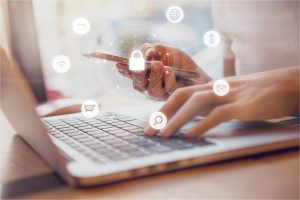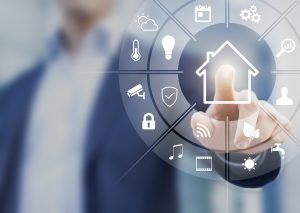Looking for ways to keep your computer, your information, and your family continuously safe? Here’s the last 6 tips on how to do just that! To read Part 1 of this series, click here.
7. Don’t Plug That In
Never plug anything into your computer that you don’t know where it came from. It could be infected with some serious malware that could put your computer and information at risk.
Have you ever been really tempted to plug in that random USB you found to see what’s on it? Expert tip: Don’t! This could actually be used as an “attack vector” or, a vulnerability point to gain access to your computer by hackers.
Similar to emails, if you don’t know where it came from or where that link leads to, don’t open it!
8. Cover Your WebCam
Hackers can access your laptop’s webcam remotely and spy without you even realizing it. It’s best to just keep it covered whenever you’re not using it.
Once criminals gain access to your webcam, it becomes very easy for them to screenshot images, exploit children, and blackmail people. The FBI in fact has had numerous cases where an individual’s webcam is hacked and then images are used for sexual harassment, blackmail, homicides, and more.
To protect yourselves and your families, be sure to:
- Disable your webcam when not in use, and
- Cover your webcam at all times (when not in use) with thick tape or stickers.
9. Housekeeping Is Your Friend
Just like cleaning out your closet, it’s important to clean out your computer. Cancel any accounts that you don’t use on a regular basis (past 6 months) and unsubscribe from unnecessary newsletters, articles, and emails.
With the amount of fake and vague sites on the web asking for your name, email, and phone number, it’s crucial to recognize when to and when not to enter your contact information. Spreading your email address to the various corners of the “dark web” can only increase your vulnerability to a security breach on your computer.
Take some time today to clean out your inbox and cancel un-used accounts. Trust us, cleaning out feels good.
 10. Secure Your Home
10. Secure Your Home
Your home is your sanctuary. Make sure your devices feel that way too.
While homes are getting smarter by the day, it’s important to make sure that all of your technology is connected through a secure network. Devices such as wireless light bulbs, robotic refrigerators, home assistants, and your smart TVs and devices create more avenues for vulnerability.
For tips on home network security, check out Heimdal Security’s “10 Steps to Maximize your Home Wireless Network Security”.
11. Don’t Overshare on Social Media
Have you ever heard the phrase “keep your friends close and your enemies closer”? Cyber criminals are pros at that. Be wary of social engineering, where individuals set out to steal your information by befriending you on social platforms. They can easily gain access to your information and to manipulate you offline via calls, emails, or text messages asking for your sensitive information.
We know it’s tempting, but try to steer clear of “checking in” to your favorite spots on social media. When you’re heading out of town on that killer vacation, leave your whereabouts unknown. Above all, DO NOT check-in while you’re home! The less data you leave on your profiles, the harder it is to compromise you.
If you get a random friend request that looks a little suspicious, before accepting them, check out their validity using this site. It will save you time and data loss in the long-run.
12. Don’t Ever Say “It Won’t Happen To Me”
Understand that although you may not be on the FBI watch list, your information could be attractive to cyber criminals. If you have money (no matter the amount), data (usernames, passwords, analytics, emails, etc), or a job, you are a target. Follow the steps above and take precautions with your information.
Every Day reminds us that identify theft, fake fraud, ransomware and malware viruses, and social schemes can make our day-to-day online experiences challenging.
Anyone that uses a WiFi connection, a smart phone, a computer, and really, any piece of technology is susceptible to a data breach. We encourage you to follow these 12 tips from our two-part series to take the first step toward protecting yourself, your information, your family, and your home today!

